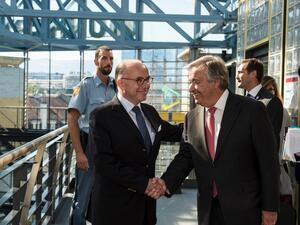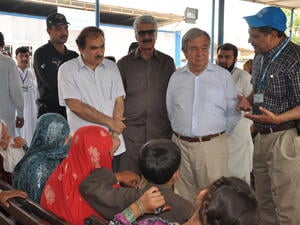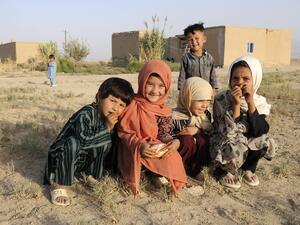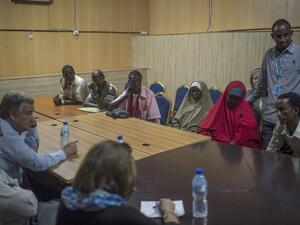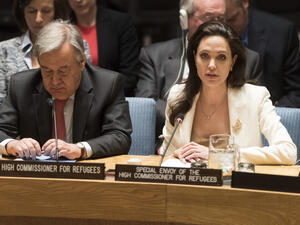UNHCR chief and Libyan partner discuss protection for refugees in mixed migration flows
UNHCR chief and Libyan partner discuss protection for refugees in mixed migration flows

A group of Africans who were trying to reach Europe from Libya before being pushed back by the Italian navy and turned over to the authorities in Tripoli. Some may have been refugees or asylum-seekers.
GENEVA, October 15 (UNHCR) - UN High Commissioner for Refugees António Guterres has held talks with UNHCR's main partner in Libya on the pressing issue of ensuring protection for refugees and asylum-seekers caught in mixed migration flows from Africa to Europe.
Each year, thousands of people from sub-Saharan Africa risk their lives to reach Libya, where they hope to board smuggler's boats for the perilous journey across the Mediterranean to Europe. Most are motivated by economic or family reasons, but many are fleeing persecution or war and are thus of concern to UNHCR.
Guterres and Gamal Al-Grable, a special envoy of the president of the International Organization for Peace, Care and Relief (IOPCR), met at the UNHCR headquarters in Geneva earlier this week to discuss ways to further boost cooperation and to ensure that all refugees and asylum-seekers detained in migration flows in Libya receive the international protection they are entitled to.
"IOPCR has played a significant role in facilitating UNHCR's work in the country" since the two sides signed a partnership agreement in 2007, Guterres told Al-Grable. "While much has been done, both organizations recognize that it is important to increase our joint efforts to overcome the remaining difficulties with the aim of establishing a comprehensive asylum system in Libya."
Al-Grable also met Assistant High Commissioner for Protection Erika Feller to discuss the mixed migration issue as well as UNHCR's presence and work in Libya. The two sides agreed to work together to improve reception facilities for people of concern to UNHCR and to seek durable solutions for them.
To date, the Tripoli-based IOPCR has helped UNHCR to secure the release of more than 630 people determined to be refugees or asylum-seekers. Moreover, the IOPCR helped UNHCR and other partners get permission to open offices in the south and east, where migration routes enter Libya. And last week, UNHCR was granted access to an additional seven detention centres, raising the total to 15 throughout the country. UNHCR is working with its partners to improve the living conditions in these centres.
Libya has come under criticism for its policies of detaining people caught in mixed migration flows, especially since Italy launched a push-back policy in the southern Mediterranean earlier this year. Italian naval vessels force intercepted boats to return to Libya, where those on board are detained.
UNHCR has on a number of occasions expressed serious concern about the impact of the push-back policy and has urged European Union member states not to turn away those who were in need of international protection.
Thanks to its agreements with Libya and the IOPCR, the UN refugee agency has been able as of the end of September to screen 890 people who were detained after being pushed back by the Italian navy. Of those, 206 were released and registered as refugees after saying they feared for their safety if sent back home.
UNHCR has been calling on countries to offer resettlement places for refugees in Libya for whom no other durable solutions are available. More than 250 have been identified as suitable for resettlement, including some refugees accepted by Italy earlier this year and waiting for their papers to be processed before leaving.

